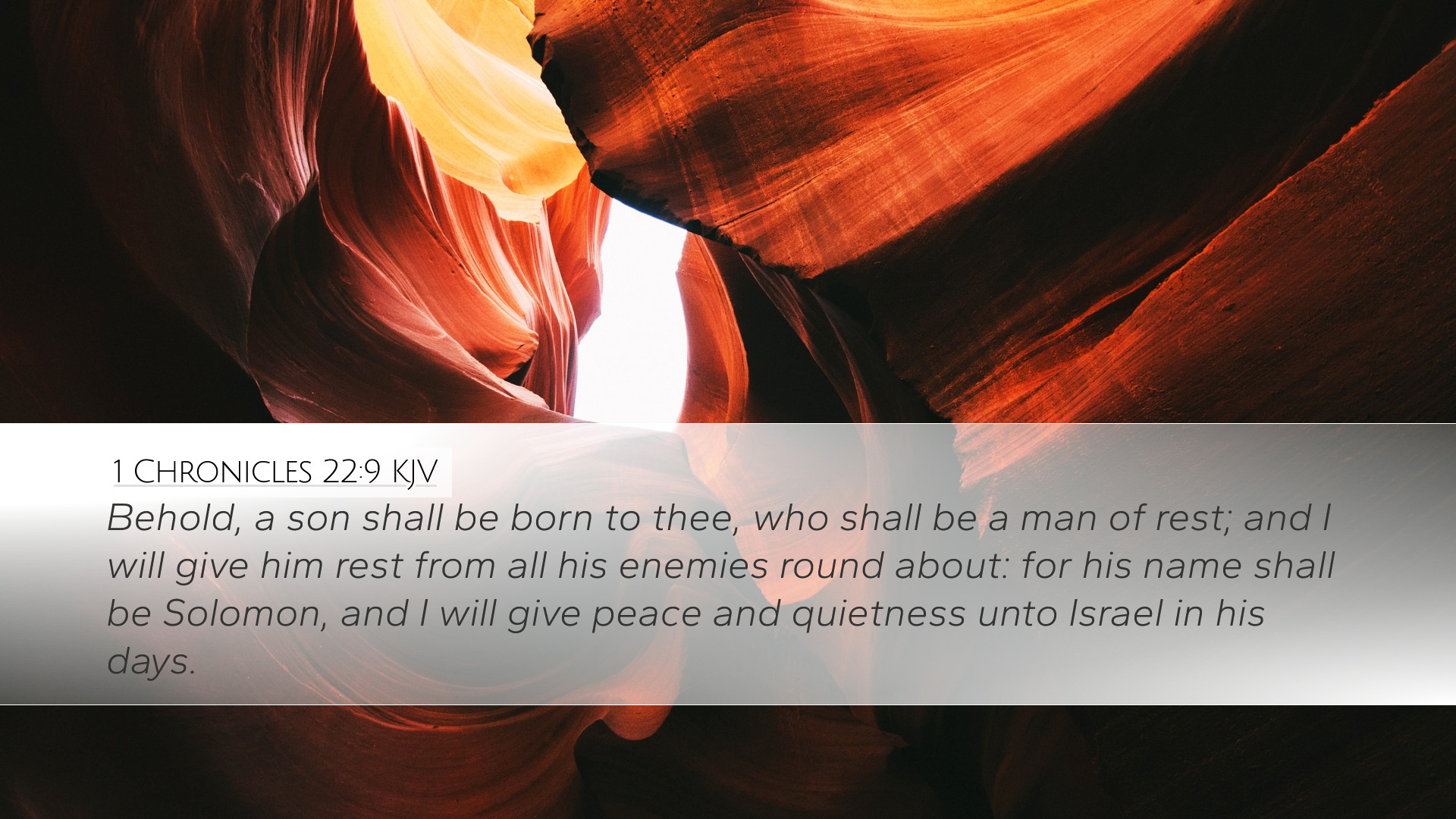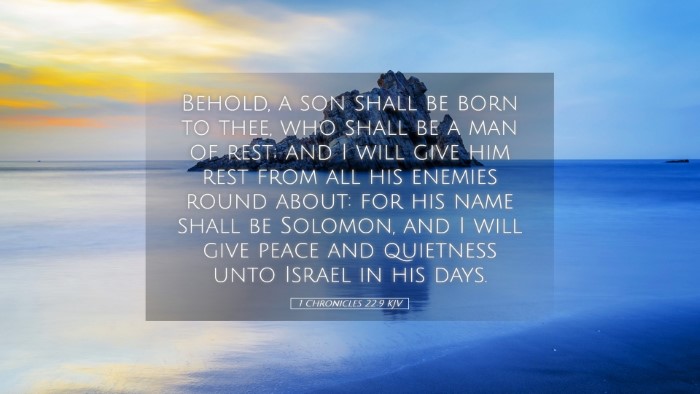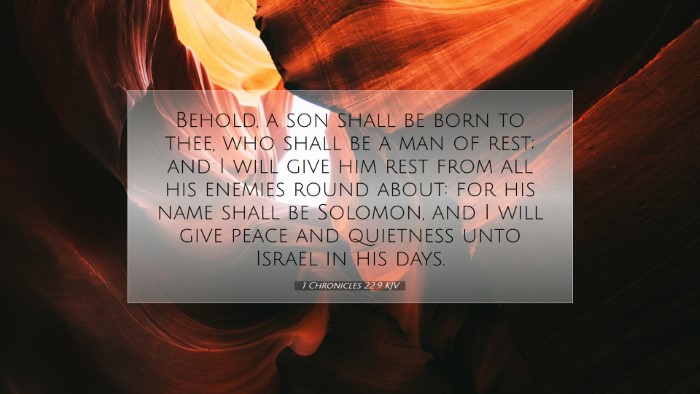Commentary on 1 Chronicles 22:9
Verse: "Behold, a son shall be born to you, who shall be a man of rest; and I will give him rest from all his enemies round about: for his name shall be Solomon, and I will give peace and quietness unto Israel in his days."
Introduction
The verse 1 Chronicles 22:9 presents a significant prophetic announcement regarding Solomon, the son of David. This promise not only addresses Solomon’s character and reign but also sets the context for the divine plan that unfolds throughout Israel's history. Understanding this verse requires a glimpse into the historical, theological, and prophetic dimensions present within this proclamation.
Historical Context
Matthew Henry provides insight into the circumstances surrounding David's life during this period. David, in his old age, was preparing for the temple's construction, having received a command from God not to build it due to the bloodshed on his hands. This preparation extends to Solomon, indicating his future role in bringing peace to a nation weary from conflict.
Albert Barnes notes that the mention of "rest" in this verse holds particular importance, considering the tumultuous years that characterized David's rule. Solomon’s reign is portrayed as a time of unprecedented peace, fulfilling God's promise to his father David while also establishing a transition of leadership that would be marked by stability.
Theological Insights
Adam Clarke emphasizes the theological implications of Solomon's name. Solomon, meaning "peace," is significant as it denotes the role he was destined to fulfill in the eyes of God. The divine assurance of peace reflects not only on personal tranquility but also on the collective peace that God intends to bestow upon Israel during Solomon’s reign. This peace can be viewed as an archetype of the ultimate peace brought into the world through Christ, portraying Solomon as a shadow of the true Prince of Peace.
Matthew Henry also elaborates on the spiritual dimensions of this promise. He highlights that God’s covenant with David was not only about political stability but the spiritual wellbeing of Israel. The role of divine providence is central here, as God is actively involved in guiding the nation's leadership to ensure that a lineage of peace and godliness is maintained.
Character of Solomon: A Man of Rest
The description of Solomon as "a man of rest" points to a unique phase in Israel's life. Albert Barnes interprets this as indicative of a leader whose reign represents tranquility rather than strife. This peace stems from not only the absence of external threats but also from a restored relationship with God, which Solomon’s leadership facilitates.
- Leadership Style: Solomon’s wisdom, as provided by God, contributed significantly to his ability to lead with discernment and fairness.
- Spiritual Influence: Solomon’s temple would become a central place of worship, instilling a sense of reverence and devotion among the people.
- Eschatological Implications: The peace during Solomon’s reign serves as a foreshadowing of the future peace to be achieved in Christ's teachings.
Rest from Enemies
The promise of rest from enemies is a significant aspect of God’s covenant. Matthew Henry articulates that God's assurance brings not just peace but a profound sense of security for the nation of Israel. This physical rest is indicative of a deeper spiritual rest that Israel was privileged to enjoy under Solomon’s reign.
Adam Clarke remarks on the fulfillment of this promise during Solomon’s rule, as many neighboring nations, recognizing Solomon’s wisdom and strength, either allied with him or refrained from conflicts, illustrating the divine orchestration of peace.
Implications for Modern Readers
This verse offers profound lessons for contemporary believers and leaders. The divine insight into leadership and the importance of creating a peaceful environment resonate deeply for pastors and spiritual leaders today. The peace that Solomon's reign represents is a vital aspect of the Christian life, encouraging us to seek peace in our communities and to trust in God's provision in our struggles.
- Promoting Peace: As leaders, the call to foster environments of peace mirrors the leadership qualities depicted in Solomon’s life. The Church, as the body of Christ, is tasked with spreading the message of peace.
- Seeking Wisdom: Solomon's request for wisdom is a model for us today. Leaders are encouraged to seek divine wisdom in decision-making, ensuring that actions align with God’s will.
- Trust in God’s Promises: This scriptural promise serves as a reminder of God’s faithfulness to His word. In times of turmoil, believers can take solace in the knowledge that God provides for His followers.
Conclusion
In summary, 1 Chronicles 22:9 is rich with meaning and prophetic declaration, establishing the basis for Solomon's peaceful reign while simultaneously interweaving themes of divine sovereignty, wisdom, and spiritual rest. As we reflect upon this verse, it becomes evident that God’s kingdom is deeply rooted in peace—a state that not only befalls nations but is also meant to dwell within the hearts of believers.


